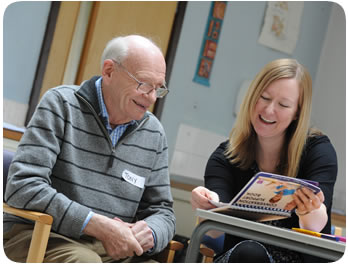
Ask the Speech and Language Therapist if they have any specific advice in relation to the person which you can use to practice in everyday conversations. Ask to be shown how to use any communication aids. There are a wide variety of aids available from a basic communication chart, to more “high tech”electronic aids or apps for smart phones. A Speech and Language Therapist will be able to assess which aids are appropriate for the person you care for and how to access or apply for these aids.
The Speech and Language Therapist may also be able to give advice on problems with using numbers in everyday situations. For example money, time, calendars. Some people will have memory, visual or concentration problems as well as a communication problem. Ask the Speech and Language Therapist about how you can help with these problems
Sometimes the Speech and Language Therapist will ask for general family information to use during therapy so the topics are as normal as possible. You can ask if family photos would help.Sometimes using a personal communication book for carers and relatives to fill in each time they visit can be useful. For example if you have been on an outing, where did you go, what did you see, who were you with, what did you do. These can all be triggers for starting a conversation.
If the person has been given facial or breathing exercises to do, encourage them to practice. This will help strengthen weak muscles and help make speaking easier.
Ask about Speech and Language Therapy in the community. In some areas there maybe a waiting list so ask how long you may have to wait. There may also be CHSS volunteers or befrienders who could visit at home to help gain confidence. There may be a CHSS group for people with communication problems locally. To check if there is a group in your area see the CHSS: community stroke services or contact the Advice Line on 0808 8010899. This is a free phone from UK landlines and most mobile networks.
If you are considering using a private Speech and Language Therapist make sure they have specialist stroke knowledge and are registered with the Health and Care Professions Council. This means they have to be regulated, registered to practice and maintain standards for professional skills.